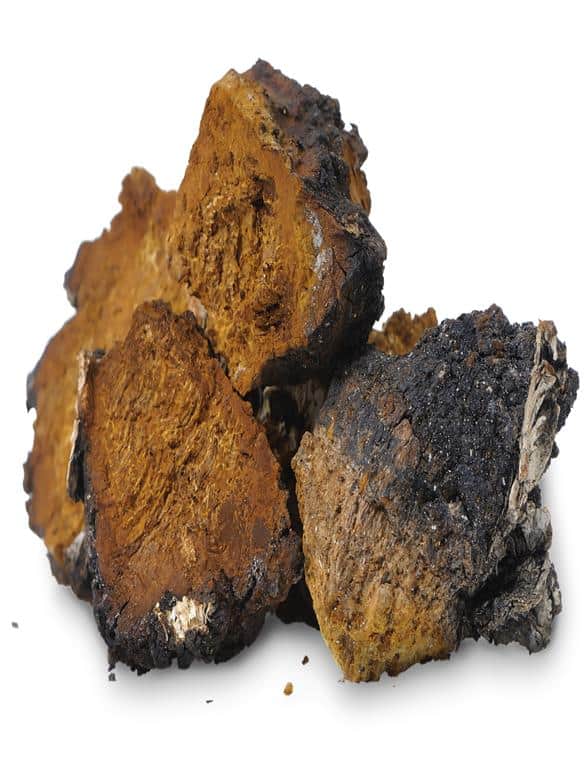
If you’re searching for ways to support your immune system naturally, then chaga might be for you.
Chaga mushroom grows on birch trees (aged 40 years or more) in Canada, Norway, Europe, the United States and northern parts of Asia. Harvested from the wild and available in health stores across North America in various forms (you’ll find teas, dried whole chaga and supplements, among others), chaga is a potent immune enhancing “fungus” that has been popular in Russia and several parts of Europe. There is a fair amount of science that supports its numerous health benefits.
In its natural state, chaga is actually dark and hard, resembling decaying wood or even charcoal, so it looks very little like mushrooms we are used to seeing and consuming. Researchers at New York’s Memorial Sloan Kettering Cancer Center keep a database of the most current studies of chaga and they say the research certainly holds promise. Often referred to as an anti-cancer agent, chaga is rich in anti-inflammatory phenols and natural antioxidants. It contains the compounds betulin and betulinic acid, both shown to demonstrate anti-tumor effects. Compounds found in chaga, called lanostanoids, also appear to play significant anti-cancer roles.
What are the health benefits?
Researchers at New York’s Memorial Sloan Kettering Cancer Center keep a database of the most current studies of chaga and they say the research certainly holds promise. Often referred to as an anti-cancer agent, chaga is rich in anti-inflammatory phenols and natural antioxidants. It contains the compounds betulin and betulinic acid, both shown to demonstrate anti-tumor effects. Compounds found in chaga, called lanostanoids, also appear to play significant anti-cancer roles.
Beyond anti-cancer effects, some studies have shown that betulin can help stimulate the immune system, lower blood sugar and control metabolic disorders, such as metabolic syndrome and obesity. Chaga is also believed to contain the mineral selenium, which can help prevent cancer. Scientists from the Vector Research Institute in southwestern Siberia have also been studying strains that could prove effective in fighting HIV and other diseases.
Of course, there are usually some cons that go along with the pros. Memorial Sloan Kettering Cancer Center states, “Clinical trials are needed to confirm chaga’s safety and effectiveness for these uses.” They also warn, “Chaga is high in oxalates, which can reduce nutrient absorption, contribute to kidney stones and be harmful in high doses, and it may interfere with blood thinners and diabetic medications.”
So, what’s the verdict?
A Google search on chaga yields almost 28 million results. A lot of what you’ll find on the topic is hype and commercialism. Similar to many foods found in nature, there will be some promising as well as concerning research. Of course, it can’t be said without a doubt that chaga is good for everyone and that it’s a cure for certain diseases. However, it certainly has an interesting history and recent studies have offered many fascinating findings, although scientific research still needs several years to develop before chaga can truly become useful from a therapeutic perspective.











